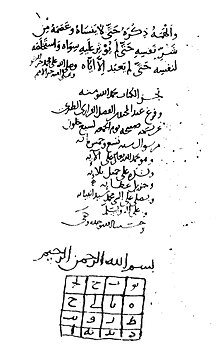 Haruniyah (هارونیه) structure in Tus, Iran, named after Harun al-Rashid, the mausoleum of Al-Ghazali is thought to be situated at the entrance of this monument
Haruniyah (هارونیه) structure in Tus, Iran, named after Harun al-Rashid, the mausoleum of Al-Ghazali is thought to be situated at the entrance of this monument
Al-Ghazali wrote more than 70 books on the sciences, Islamic philosophy and Sufism. 
Last page of Al-Ghazali's autobiography in MS Istanbul, Shehid Ali Pasha 1712.
Al-Ghazali had mentioned the number of his works "more than 70", in one of his letters to Sultan Sanjar in the late years of his life. However, there are more than 400 books attributed to him today. Making a judgment on the number of his works and their attribution to al-Ghazali is a difficult step.
Finally, Abdel Rahman Badawi, an Egyptian scholar, prepared a comprehensive list of al-Ghazali's works under 457 titles:
- from 1 to 72: works definitely written by al-Ghazali
- from 73 to 95: works of doubtful attribution
- 96 - 127: works which are not those of al-Ghazali with most certainty
- 128 - 224: are the names of the Chapters or Sections of al-Ghazali's books that are mistakenly thought books of his
- 225 - 273: books written by other authors regarding al-Ghazali's works
- 274 - 389: books of other unknown scholars/writers regarding al-Ghazali's life and personality
- 389 - 457: the name of the manuscripts of al-Ghazali's works in different libraries of the world
Theology
- al-Munqidh min al-dalal (Rescuer from Error)
- Hujjat al-Haq (Proof of the Truth)
- al-Iqtisad fil-i`tiqad (Median in Belief)
- al-maqsad al-asna fi sharah asma' Allahu al-husna (The best means in explaining Allah's Beautiful Names)
- Jawahir al-Qur'an wa duraruh (Jewels of the Qur'an and its Pearls)
- Fayasl al-tafriqa bayn al-Islam wa-l-zandaqa (The Criterion of Distinction between Islam and Clandestine Unbelief)
- Mishkat al-Anwar (The Niche for Lights, a commentary on the Verse of Light)
- Tafsir al-yaqut al-ta'wil
- Mizan al-'amal (Criterion of Action)
- Ihya' ulum al-din, "Revival of Religious Sciences"
- Bidayat al-hidayah (Beginning of Guidance)
- Kimiya-yi sa'ādat (The Alchemy of Happiness) [a résumé of Ihya'ul ulum, in Persian]
- Nasihat al-muluk (Counseling Kings) [in Persian]
- al-Munqidh min al-dalal (Rescuer from Error)
- Minhaj al-'Abidin (Methodology for the Worshipers)
- Maqasid al falasifa (Aims of Philosophers) [written in the beginning of his life, in favour of philosophy and presenting the basic theories in Philosophy, mostly influenced by Avicenna's works]
- Tahafut al-Falasifa (The Incoherence of the Philosophers), [in this book he refutes the Greek Philosophy aiming at Avicenna and Al-Farabi; and of which Ibn Rushd wrote his famous refutation Tahafut al-tahafut (The Incoherence of the Incoherence)]
- Miyar al-Ilm fi fan al-Mantiq (Criterion of Knowledge in the Art of Logic)
- Mihak al-Nazar fi al-mantiq (Touchstone of Reasoning in Logic)
- al-Qistas al-mustaqim (The Correct Balance)
- Fatawy al-Ghazali (Verdicts of al-Ghazali)
- Al-wasit fi al-mathab (The medium [digest] in the Jurisprudential school)
- Kitab tahzib al-Isul (Prunning on Legal Theory)
- al-Mustasfa fi 'ilm al-isul (The Clarified in Legal Theory)
- Asas al-Qiyas (Foundation of Analogical reasoning)

No comments:
Post a Comment